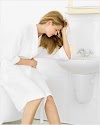Lactose intolerance
Individuals who lack the enzyme lactase are not able to digest lactose, a sugar common in milk and milk products. This causes symptoms of gas, bloating, and diarrhea. Because lactose is not metabolized, it increases the osmotic pressure in the intestines and, therefore, acts as a hyperosmotic laxative.
Eliminating lactose from the diet or consuming it in small quantities will generally prevent symptoms. Because a relatively large portion of the US population has lactose intolerance, foods that have reduced lactose or are lactose free are available in food markets. These include Lactaid Free Milk, Dairy Ease Fat Free Milk, and soy milk products. Another alternative to solving this problem relies on providing lactase enzyme as a dietary supplement or a food by using products such as Lactaid. The FDA is considering classifying lactase as an OTC drug but has not done so at this time.
Probiotics
The human GI tract contains a variety of bacteria known collectively as ‘gut flora’; these have several important functions in the body, such as synthesizing vitamin K and helping to maintain normal bowel balance and function. Bouts of noninfectious diarrhea deplete the GI tract of these bacteria. The use of oral preparations containing live strains of normal gut flora, probiotics, assists in repopulating the GI tract, reducing the duration of diarrhea, and possibly preventing other episodes of diarrhea. Individuals who are prescribed antibiotic drugs that affect a wide range of bacteria, including gut flora, often develop diarrhea.
Lactobacillus and Bifidobacterium are the two most common species of nonpathogenic bacteria used as probiotics; Saccharomyces boulardii, a yeast, is another popular probiotic. The efficacy of the various strains of Lactobacillus vary, and those with the most positive results in published studies are L. acidophilus, L. bulgarius, L. casei, and L. reuteri. Several of these species are present in yogurts, fermented milk and soy milk.30 Preparations of these bacteria are available in capsule form and as granules. The FDA regulates these products as dietary supplements and foods, not OTC drugs.
Electrolyte solutions
The excessive watery stools that occur during diarrhea may result in dehydration. Several OTC electrolyte solutions are available to help to prevent the loss of both fluid volume and electrolytes during diarrhea. Most products are formulated based on the recommendations of the World Health Organization (WHO) oral rehydration solutions. Apple juice, other fruit juices, and carbonated beverages may contain a high quantity of carbohydrates and should be avoided. Such high-carbohydrate drinks could worsen diarrhea because of they would increase osmotic pressure in the GI tract, thus acting as osmotic laxatives.
Miscellaneous products
Internal oral deodorants
Drug category and usage
Individuals who have ostomies (ileostomy or colostomy) or urinary and fecal incontinence experience difficulty with control of odors.
Monograph ingredients
Chlorophyllin copper complex, bismuth subgallate.
Mode of action
No specific test for efficacy or mode of action is given in the FDA monograph that recognizes chlorophyllin copper complex and bismuth subgallate as monograph ingredients to help to reduce odor problems resulting from ostomies or incontinence problems. Individuals who have odor problems should also avoid foods that are likely to cause odors, such as fish, eggs, garlic, onions, and asparagus. Vitamin products and some prescription antibiotics also cause odor problems.
Warnings and precautions
If cramps or diarrhea occur with chlorophyllin copper complex, the recommended dose should be reduced; if symptoms continue, consult your physician.
Recommended dose
Chlorophyllin copper complex may be used by adults and children 12 years of age or older in doses of 100 mg but should not exceed 300 mg per day. Bismuth subgallate may be used by adults and children 12 years of age or older in doses of 200 to 400 mg up to four times a day.







1 Comments
I was diagnosed as HEPATITIS B carrier in 2013 with fibrosis of the
ReplyDeleteliver already present. I started on antiviral medications which
reduced the viral load initially. After a couple of years the virus
became resistant. I started on HEPATITIS B Herbal treatment from
ULTIMATE LIFE CLINIC (www.ultimatelifeclinic.com) in March, 2020. Their
treatment totally reversed the virus. I did another blood test after
the 6 months long treatment and tested negative to the virus. Amazing
treatment! This treatment is a breakthrough for all HBV carriers.